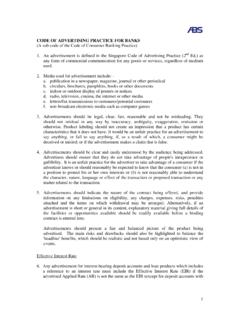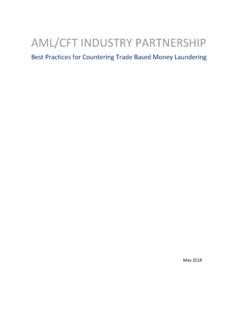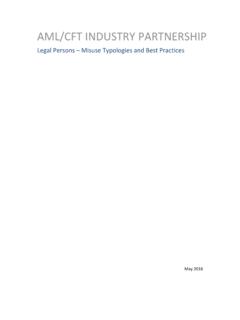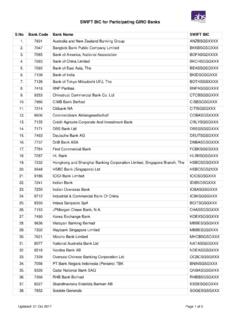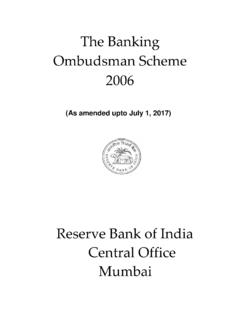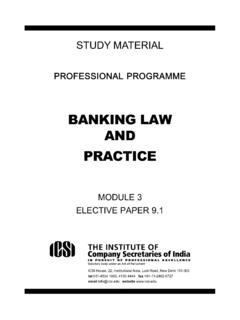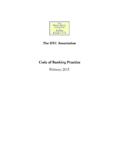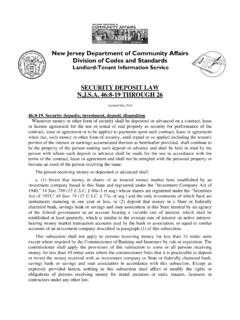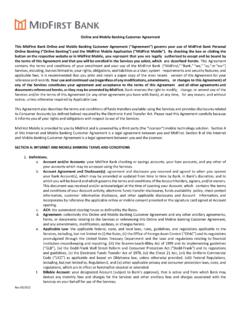Transcription of PRIVATE BANKING IN SINGAPORE - ABS
1 PRIVATE BANKING Code of Conduct (PB Code) Effective 1 Sep 2020 1 PRIVATE BANKING IN SINGAPORE Code of Conduct ( Code ) PRIVATE BANKING Code of Conduct (PB Code) Effective 1 Sep 2020 2 Contents Introduction .. 3 Framework to the Code of Conduct .. 4 Competency .. 7 1. Key Principles .. 7 2. Competency Assessment .. 8 3. Continuing Professional Development .. 10 Market Conduct .. 12 4. Key Principles .. 12 5. Professionalism .. 13 6. Client Relationship Management .. 16 7. Operational Framework .. 27 Addendum 1 Industry Sound Practices .. 34 Annex: Summary of Changes to PB Code .. 41 PRIVATE BANKING Code of Conduct (PB Code) Effective 1 Sep 2020 3 Introduction The PRIVATE BANKING Advisory Group ( PBAG ), comprising senior industry leaders (representatives from the PRIVATE BANKING industry), was established in January 2010 with the support of the Monetary Authority of SINGAPORE ( MAS ) to further strengthen the competency and market conduct standards of the PRIVATE BANKING industry in SINGAPORE .
2 In this connection, the PBAG has developed this Code to foster professional standards , enhance transparency to clients and confidence in the PRIVATE BANKING industry in SINGAPORE . This Code sets out standards of good practice on competency and market conduct expected of financial institutions (including their staff) operating in the PRIVATE BANKING industry in SINGAPORE which are providing financial services to Accredited Investors ( AIs )1. This Code sets out the level of competency expected of staff in the PRIVATE BANKING industry providing financial/wealth advisory services to AIs, and how this level of competency should be maintained on an ongoing basis. This Code also includes general standards of professional conduct relating to the way in which financial institutions and their staff are expected to carry out their business activities, especially with regard to due diligence, fair and transparent disclosure as well as operational and compliance practices.
3 Given the dynamic nature of the industry, this Code will be updated by the PRIVATE BANKING Industry Group ( PBIG )2 from time to time to ensure continued relevance to the industry and its practitioners. 1 Refer to Section 4A of Securities and Futures Act (Chapter 289) and the Securities and Futures (Classes of Investors) Regulations 2018 for the definition of AIs. 2 PBAG was re-constituted as PBIG in 2011. The PBIG will build upon the work of PBAG in shaping the growth of the PRIVATE BANKING sector. PRIVATE BANKING Code of Conduct (PB Code) Effective 1 Sep 2020 4 Framework to the Code of Conduct This Code comprises two main pillars: 1. Competency 2. Market Conduct The scope of the two pillars is as follows: Competency Key relevant competencies required in the financial landscape.
4 Assessment and/or continuous training standards for persons in the PRIVATE BANKING industry of varying seniority in their provision of financial/wealth advisory services to AIs. Market Conduct Market conduct standards to ensure professionalism, client due diligence, appropriate advisory standards and resolution of client complaints. PRIVATE BANKING Code of Conduct (PB Code) Effective 1 Sep 2020 5 Application It is intended that this Code will provide guidance on standards of good practice that may be used by any financial institution or a division thereof in the PRIVATE BANKING industry which is regulated by the MAS, where the financial institution or division provides services to AIs ( Covered Entity ). A Covered Person shall refer to an individual who is in a client-facing role and provides financial/wealth advisory service(s), BANKING transactional service(s) ( deposit taking/payments), brokerage service(s) and granting of loans/credit facilities to AIs on behalf of a Covered Entity.
5 Covered Persons may include, but would not be limited to, relationship managers (RMs)/client advisors, investment advisors/investment consultants/investment specialists, product specialists and wealth planners. These standards are intended to provide broad guidance, and are not meant to be exhaustive or to replace any legislation, regulations or guidelines issued by the relevant authorities in SINGAPORE . Further reference should always be made to applicable legislation, regulations or guidelines, which may include but would not be limited to the following: (a) BANKING Act; (b) Securities and Futures Act; (c) Financial Advisers Act; (d) The Corruption, Drug Trafficking and Other Serious Crimes (Confiscation of Benefits) Act; (e) Terrorism (Suppression of Financing) Act; and (f) Subsidiary legislation, notices, guidelines and information papers issued by the relevant regulatory authorities, such as the following: (i) The Monetary Authority of SINGAPORE (Anti-terrorism PRIVATE BANKING Code of Conduct (PB Code) Effective 1 Sep 2020 6 Measures) Regulations 2002; (ii) Notices and Guidelines Prevention of Money Laundering and Combating Terrorist Financing.
6 (iii) Guidelines on Risk Management Practices; (iv) Guidance on PRIVATE BANKING Controls (June 2014); (v) Guidelines on Outsourcing; (vi) Guidelines on Fair Dealing Board and Senior Management Responsibilities for Delivering Fair Dealing Outcomes to Customers; and (vii) Guidelines on Fit and Proper Criteria. The Board and senior management of Covered Entities are expected to ensure that appropriate policies and procedures as well as systems and controls are in place to observe these standards and ensure compliance with applicable laws and regulations, to the extent applicable. PRIVATE BANKING Code of Conduct (PB Code) Effective 1 Sep 2020 7 Competency The purpose of the competency framework is to establish standards relating to the assessment and continuous training for all Covered Persons.
7 1. Key Principles Covered Entities and their Covered Persons providing financial/wealth advisory services to AIs should conduct their business activities with integrity and professionalism and ensure that they possess a requisite level of competence and knowledge. The competency framework comprises expected standards on: Competency assessment; and Continuing professional development. PRIVATE BANKING Code of Conduct (PB Code) Effective 1 Sep 2020 8 2. Competency Assessment Competency Assessment Client Advisor Competency standards Subject to paragraphs and , the Covered Person is expected to pass the Client Advisor Competency standards ( CACS ) before he/she provides any financial/wealth advisory service to AIs on behalf of his/her Covered Entity. This applies regardless of whether the Covered Entity for whom the Covered Person acts on behalf of has its own internal Institute of BANKING and Finance ( IBF ) accredited program.
8 Notwithstanding paragraphs and , the expectation to pass the CACS does not apply to: (a) Any Covered Person who is FICS-certified for the job family Relationship Management High Net Worth, Job Role IV or above as at 1 September 2011; or (b) Any Covered Person who possesses at least 15 years of relevant financial services-related experience as at 1 September 2011. (c) Any Covered Person who is a wealth planner representing Covered Entities as at 31 December 2018. In lieu of the CACS, any Covered Person under (b) is expected to complete a specified non-examinable course within 18 months from 1 September 2011. With effect from 1 January 2019, any Covered Person who is a CFA charterholder can be exempted from CACS Paper 2 (Industry & Product Knowledge). The Compliance or Human Resource Department of the Covered Entity is expected to determine whether a Covered Person under (b) PRIVATE BANKING Code of Conduct (PB Code) Effective 1 Sep 2020 9 possesses the relevant financial/wealth services-related experience.
9 The CACS will comprise questions relating to the knowledge dominant competencies within the IBF standards Training Scheme framework that Covered Persons are expected to possess, including: - Market Conduct - Product Knowledge The CACS will be centrally administered by the IBF. Implications for Covered Persons who do not pass the CACS Any Covered Person, subject to paragraph , who does not pass the CACS, should not advise clients. The Covered Entity is expected to have in place adequate systems and processes to monitor and address non-observance of paragraph , including appropriate rectification measures. PRIVATE BANKING Code of Conduct (PB Code) Effective 1 Sep 2020 10 3. Continuing Professional Development Continuing Professional Development To ensure that knowledge and skills are kept current with industry and regulatory developments, continuing professional development ( CPD ) is a critical component to ensure the ongoing competency of Covered Persons.
10 All Covered Persons are expected to achieve a minimum of 15 hours3 of CPD in each calendar year. The appropriate combination of the CPD hours to be achieved by the Covered Persons is expected to be determined pursuant to the CACS CPD Information Advisory Note and by the Covered Entity for whom the Covered Person acts on behalf of. In general, CPD activities should constitute formal documented learning, which may include but would not be limited to, attending courses, workshops, lectures or seminars as well as e-learning courses. All Covered Persons are expected to maintain their own records of how the expected CPD hours are met. This should include: (a) name of the course attended; (b) date of the course; (c) whether it is held internally or externally; and (d) number of hours attended.

